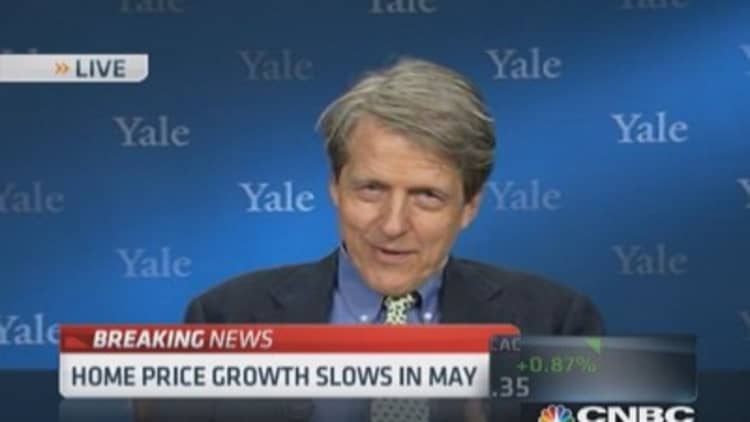
U.S. single-family home prices fell in May, falling short of expectations of a slight gain, a closely watched survey said Tuesday.
The S&P/Case Shiller composite index of 20 metropolitan areas declined 0.3 percent in May on a seasonally adjusted basis. A Reuters poll of economists forecast a gain of 0.2 percent.
Read MoreUS pending home sales unexpectedly fall in June
Nonseasonally adjusted prices rose 1.1 percent in the 20 cities, compared with an expectation of a 1.5 percent rise.
"What I find particularly interesting is that on a seasonally adjusted basis, nationally, home prices are falling only a smidgen—three-tenths of 1 percent—but the way these markets go, that could possibly be a turning point," Robert Shiller told CNBC in an interview on "Squawk on the Street."
With pending home sales and new home sales down, however, "there's some clear evidence of a weakening," he added.
"Housing has been turning in mixed economic numbers in the last few months," said David Blitzer, chairman of the index committee at S&P Dow Jones Indices.
"Prices and sales of existing homes have shown improvement while construction and sales of new homes continue to lag," he said in a statement.
Read More4 ways to pay off your mortgage earlier
Prices in the 20 cities rose 9.3 percent year over year, the slowest year-over-year gain since February 2013 and shy of expectations for a 10 percent climb.
The seasonally adjusted 10-city gauge fell 0.3 percent in May versus unchanged in April, while the nonadjusted 10-city index rose 1.1 percent in May compared to a 1 percent gain in April.
Year over year, the 10-city gauge rose 9.4 percent.
"The market has been very strong since 2012. It's up 27 percent since March of 2012. It's been a huge boom," Shiller said. "The question is what would end that boom? It might continue. This might be a little downward blip and it might continue going up, but you know, I kind of think it's not going to go up a lot more—maybe 10 percent more—before a correction."
Shiller said it's clear something is worrying consumers, and he suggested that perhaps rising geopolitical tensions around the world may be to blame.
"It seems like optimism about housing is weakening," he said. "Maybe the internationals, maybe all this talk about Ukraine has people rattled. You know, I've felt that in the past, that international news affects the housing market. I don't have proof of that, but something is weighing on the consumers right now."
Meantime, a lack of credit has been a "festering problem" for the housing market, but "inevitable since had a banking crisis," he said. Credit availability is "not going to correct soon."
On the other hand, the Conference Board said Tuesday its Consumer Confidence Index rose to 90.9, above the prior month's showing of 86.4. That was its highest level since October 2007, and well above economists' expectations of an 85.3 reading,
Read MoreUS confidence soars to highest in nearly 7 years
—By Reuters. CNBC contributed to this report.

